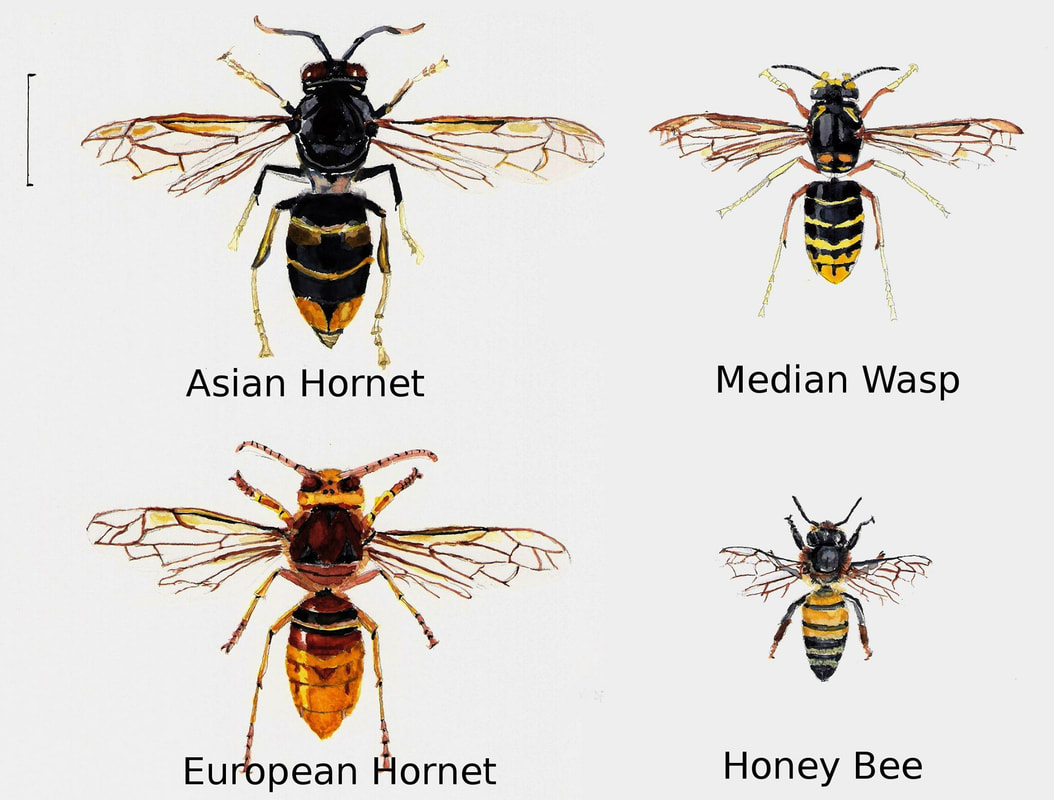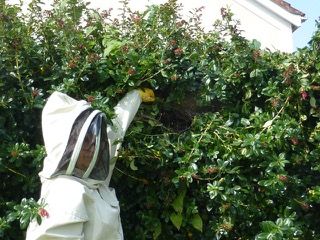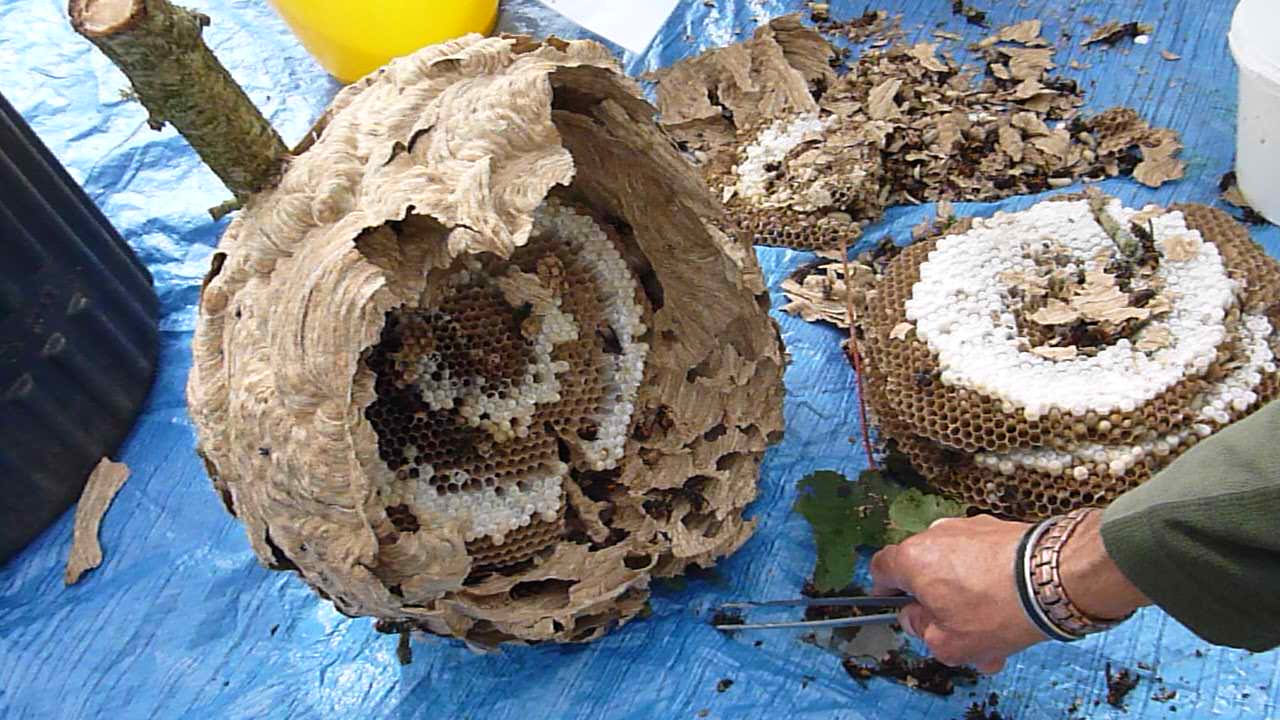|
At our Council meeting on Saturday it was decided to set up an Asian Hornet Action Team (AHAT) with Lynne Ingram as our co-ordinator. Initially it will be a county-wide team made up of a member from each of the Divisions; later Divisions may wish to develop their own action teams.
Lynne was in Jersey at the end of August helping beekeepers to track Asian hornets back to their nests and is passionate about the need for us to get prepared to protect our bees and other insects. SBKA has produced information sheets and ID cards which are/have been distributed to all Divisions. To get free supplies of laminated Asian hornet posters for use in local garden centres, shops, notice boards, sports grounds, district councils etc, contact: [email protected] Meanwhile, install monitoring traps, spend time observing activity in your apiaries and around insect-attracting flowering plants and spread the word! SBKA member Lynne Ingram reports from the front line fighting Asian hornets in Jersey
Today we headed off to the Bowls Club to remove the nest from the hedge. The nest was actually destroyed by the pest controllers yesterday after a man was hospitalised, so the hornets themselves will be dead. The pest controllers inject a contact insecticide at pressure into the nest. The hornets inside should die fairly quickly and the ones that are out should die when they return and contact the insecticide. Unfortunately sometimes dead and dying hornets covered in insecticide powder fall out of the nest onto the ground below. This can be a hazard to the public but also birds and other things that could come into contact with them. In this case the nest was inside the hedge, so any hornets would have fallen down inside. We were kitted up in bee suits and Bob Hogge was resplendent in his hornet suit, but there were no hornets around. The nest was quite small – about 1 foot across with 2 layers of cells and was possibly a late secondary nest – perhaps where the queen was disturbed at her first nest location. As you can see in the photo it was totally hidden within the hedge, and no one had noticed hornets flying in and out. We then headed off to the La Preference area where a team had been tracking a nest for a few days, and were reporting up to 15 hornets at their bait station. They had an idea where they thought the nest was but just couldn’t pin it down. The trapping was complicated by hundreds of wasps being attracted to the Suterra that we were using in the bait stations, and people were getting stung. A new volunteer, who was a keen fly fisherman had been recruited to the team, and was experimenting with sticking feathers onto the thorax of the hornets, to aid in tracking their flight, as in wooded areas it is easy to lose sight of the hornets in flight against the trees. He had cut a slot in a queen marking cage to accommodate the feather, but needed to balance it being big enough for us to see, against the ability of the hornet to fly once it was stuck on. It is surprising how much a feather can weigh – you just don’t consider it until trying to stick it to a hornet! In the evening we were counting and sorting dead hornets from a large nest that had previously been removed and killed without insecticide. We counted around 700 hornets that had been found within the nest, and were trying to sort them by size, being newly emerged or with visible sting. The idea was to see if there were any drones or queens present, but this is very difficult as there are no obvious external differences. Queens are often heavier – 500mg plus, but workers can weigh from 230 – 400mg depending on the amount of food received as a larva. Drones can only really be differentiated by the extra antennal segment, or by dissection. SBKA member Lynne Ingram is on the Asian hornet front line in The Channel Islands
Today was forecast to rain all day so we weren’t sure how much hornet tracking we would be able to do. In the morning I went for a walk with Bob and his dogs so that we could see where hornets were first discovered in Jersey - sipping sap in a hollow in an old tree. The sap was attracting all sorts of insects and some local entomologists had been recording what was there when they spotted an Asian hornet. They told Bob, and he then started to try and track it back to its nest – which turned out to be the first of 11 that year, and the beginnings of the ‘Jersey Method’ of tracking the hornets. As the rain didn’t materialise we set up a bait station near La Preference to get a back bearing, and soon attracted hornets that were flying back to the area where it was suspected that the nest was. A new volunteer from Gloucestershire was arriving today, and we went to meet her. We then spent some time investigating the nest that Bob had ‘killed’ with CO2. After two doses of CO2, and then going into the freezer, we were sure that they would be dead this time but we were wrong! Asian hornets are very tough, and the nests provide tremendous insulation! Shortly after removal from the freezer, new hornets started emerging from the comb, and most of the larvae were still alive. We watched the newly emerged hornets stimulate the larvae’s mouths to give them sweet food. Bob gave the larvae some mince, and we watched them munching away. Some of the newly emerging hornets had no wings – we weren’t sure if it was because of the freezing or as a result of some genetic abnormality or a type of deformed wing virus. Later we went to put out a new bait station on a private nature reserve near La Preference - again moving nearer the nest site. There are no laws of trespass in Jersey but we did always try to get permission to be on the land we were working on, and people were generally very friendly and interested in what we were doing. The law of course is different in England. One of the beekeeper volunteers from Devon was going home today, but we had time to discuss the Asian Hornet Action Teams, and the contents of the kit box that each team will need:-
|
Archives
March 2024
Categories
All
|
Somerset Beekeepers Association Charity © 2021 Registered CIO Charity 1206483
Affiliated to the British Beekeepers Association
Click here to view our Privacy Policy
Affiliated to the British Beekeepers Association
Click here to view our Privacy Policy



 RSS Feed
RSS Feed
